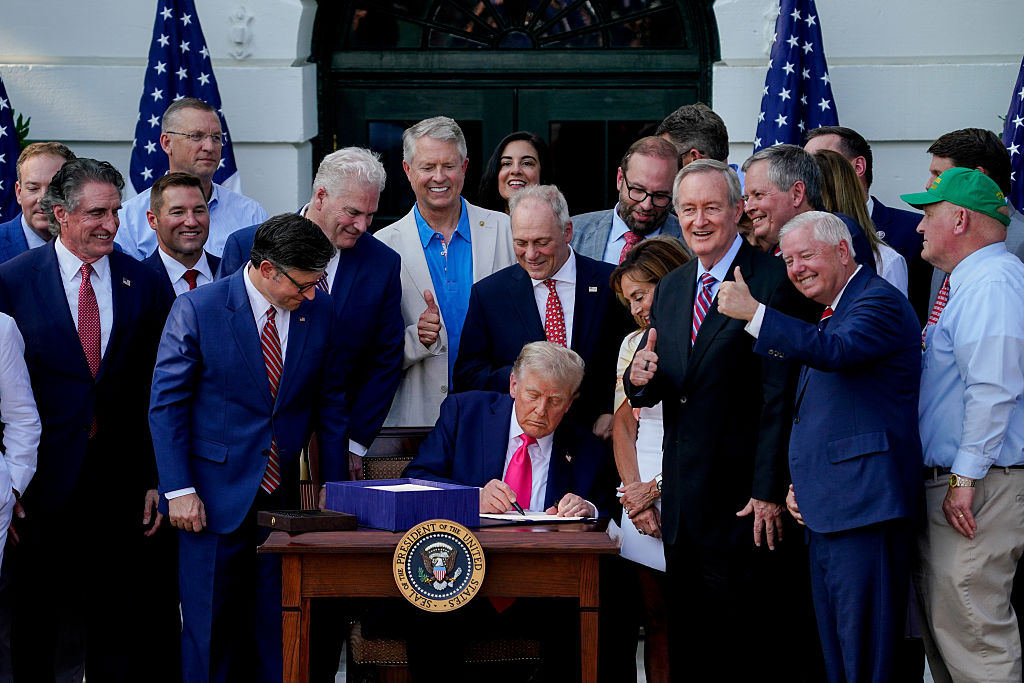
In less than six months, seismic shifts in U.S. policies pertaining to trade, migration and foreign assistance have dramatically altered the landscape for U.S.–Latin America relations. Just last week, on the eve of July 4, Congress passed the so-called “Big Beautiful Bill,” President Trump’s signature tax and spending legislation. One of the most consequential bills of this generation, it’s set to further reset the status quo by reshaping domestic policy.
Its reach, however, extends beyond U.S. borders: expanded immigration enforcement, energy development initiatives, and a tax on remittances will have ripple effects throughout the region.
What will these shifts mean for the near future in Latin America? While the impacts are numerous, the fundamental element lurking behind the headlines is the risk that the U.S. will continue to distance itself from its longstanding allies in the hemisphere.
Immigration enforcement
As part of the Trump Administration’s goal to achieve 1 million annual deportations, the new bill finances a massive increase in immigration enforcement. It allocates $170 billion for immigration and border-related operations, including nearly $47 billion for border wall construction. It adds thousands of new immigration enforcement officials, and provides $45 billion to build and operate new detention facilities, including some for families, adding tens of thousands of new detention beds.
The Trump administration will dramatically expand immigration enforcement while also making more people eligible for deportation by terminating—or seeking to terminate—legal status for over a million individuals who previously held Temporary Protected Status or who held work authorization after entering the U.S. under a grant of parole.
Therefore, countries in the Americas will need to prepare for the impact of increased deportations of their nationals, and in the case of Central American nations that have signed migration agreements with the U.S., of certain third-country nationals. Central American countries will be most affected, as their reception and reintegration services for returned migrants will be further strained due to the shuttering of USAID, which previously supported such efforts.
Energy policy and critical minerals
Additionally, and in a sharp departure from the Biden Administration’s efforts to invest in clean energy and confront climate change, Republican legislators eliminated tax credits from the 2022 Inflation Reduction Act (IRA), including for eco-friendly technologies, solar panels, wind turbines, and electric cars. They eliminated, for example, tax credits from the IRA that were provided to U.S. businesses to help them build domestic supply chains for critical minerals such as lithium, cobalt, nickel and rare earths.
Lower U.S. clean energy production will likely temper the ambitions of some world leaders headed to COP30 in Brazil this November—the 30th United Nations climate conference—to reduce the use of fossil fuels.
However, the rest of the world will continue to move forward with the energy transition for economic reasons. The renewables boom will continue throughout the Americas, albeit with different partners and alongside the continued use of oil and gas. For example, the elimination of these clean energy tax credits is likely to provide China with an opportunity to expand its presence in Latin America and the Caribbean, seeking to fill the void by offering increased financing and technology for renewable energy in the Americas.
Remittances taxed
The legislation imposes a federal tax on remittances. This new tax is expected to affect immigrant communities in the United States, reverberate in immigrants’ countries of origin and drive remittances from traditional platforms toward informal channels and newer options, such as cryptocurrency.
The one percent tax, down from its original level of five percent in the bill initially introduced in the House of Representatives, exempts remittances paid with a U.S.-issued debit or credit card or from a financial institution. Cash and money order transactions, however, are subject to the tax.
This will likely result in a reduction of remittance flows through formal remittance channels as individuals seek to avoid the additional tax burden and circumvent formal channels due to data collection requirements that could expose migrants vulnerable to deportation. Just as importantly, it could also trigger copycat state and local taxes on remittances, further impacting flows to countries throughout Latin America and the Caribbean.
The Center for Global Development estimates that Central America and Jamaica would be hit the hardest in terms of the scale of the projected losses as compared to each country’s economy.
In addition to senders and receivers, impacts will be felt by banks and fintech platforms on which remittances flow. Each of these entities will face additional compliance burdens, and companies could face financial losses resulting from reduced remittance flows.
Economic uncertainty
At a time of considerable macroeconomic fragility—due in large part to President Trump’s global tariff agenda—significant new debt incurred in the “Big Beautiful Bill” could further damage the U.S. economy. According to the Congressional Budget Office, the legislation would add $3.3 trillion to the U.S. national debt.
The “Big Beautiful Bill” is more than a domestic move: It will force Latin American countries to recalibrate as they adapt to this new landscape. After slashing foreign aid earlier this year, the U.S. is now poised to tax remittances, dramatically expand immigration enforcement, and backtrack on clean energy policy. Geography is destiny, and more than any single provision in the legislation, the new debt created by this bill is likely to weaken the U.S. economy and negatively impact the economies of its regional partners. Absent efforts to shore up regional integration, the likely consequence over time is a further delinking of Latin American and Caribbean economies from the U.S.










